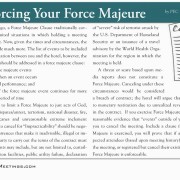Enforcing Your Force Majeure
Not too long ago, a Force Majeure Clause traditionally covered only limited situations in which holding a meeting would be impossible. Now, given the times and circumstances, the clause should include much more. The list of events to be included is a matter of negotiation between you and the hotel, however, the following elements should be addressed in a force majeure clause:
- Definition of force majeure events
- What happens when an event occurs
- Who can suspend performance; and
- What happens if the force majeure event continues for more than a specified period of time
It is not enough to limit a Force Majeure to just acts of God, war, strikes, labor disputes/unrest, terrorism, national disaster, fire, earthquakes, hurricanes, and unreasonable extreme inclement weather. The right to cancel for “Impracticability” should be negotiated as well. Occurrences that make it inadvisable, illegal, or impossible for either party to carry out the terms of the contract must be listed. These events may include, but are not limited to, curtailment of transportation facilities, public utility failure, declaration of “severe” risk of terrorist attack by the U.S. Department of Homeland Security, or an issuance of a travel advisory by the World Health Organization for the region in which the meeting is held.
A threat or scare based upon media reports does not constitute a Force Majeure. Cancelling under these circumstances would be considered a breach of contract; the hotel will argue that they are entitled to monetary restitution due to unrealized revenue you agreed to in the contract. If you exercise Force Majeure, you must provide reasonable evidence that “events” outside of your control caused you to cancel the meeting. Include a clause that says, if a Force Majeure is exercised, you will prove that at least 30% of expected attendees (based upon meeting history) do not register for the meeting, or registered but cancel their existing registration, the Force Majeure is enforceable.







